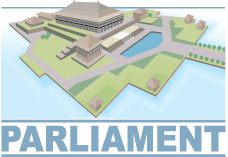Justice for the Judiciary
View(s):The planned impeachment of the Chief Justice Shirani Bandaranayake is drawing far more attention than the previous two attempts in the case of Neville Samarakoon (1984) and Sarath N. Silva (2001).
There’s no doubt – that the motion has been triggered by the negative judgment in the Divi Neguma bill and the ‘hostile’ statements by the Judicial Services Commission (JSC) alleging interference in the judiciary. A government parliamentarian from Puttalam has said publicly that the provocation for the impeachment was the Divi Neguma bill judgment.
While the impeachment of two earlier incumbents of this office – Samarakoon and Sarath Silva – also triggered protests, current support for Dr Bandaranayake has turned into an anti-government-like campaign. On the other hand pro-government forces are also flexing their muscles for a bigger showdown when the Select Committee gets deeper into questioning the Chief Justice and the inevitable happens – recommendation of action.Clearly what is missing in the public discourse is that in impeaching the Chief Justice, the core issue at stake is the attack on the office (institution) of the Chief Justice, not the individual herself.
“This is not an issue relating to Dr Bandaranayake because I have openly criticised some of her judgments like the one on religious conversions and the 18th amendment to the Constitution. It’s about the procedure that is being used in the impeachment process,” noted Dr Jayampathy Wickramaratne, President’s Counsel and Constitutional expert when he addressed members of the Sunday Times Business Club on Thursday.
He said it doesn’t matter whether the Chief Justice is guilty or not – she has to defend herself. “But the issue that we have is … is the right process being followed,” he said adding that if a group of politicians a (Select Committee) is allowed to recommend the impeachment of the Chief Justice, other judges will be wary of delivering verdicts against the government.
Like it or not, the government is losing rapidly its grip on governance, transparency and credibility. A case in point is the Central Bank’s acquisition of a property in New York in August 2011 without a murmur to the public. Why wasn’t this disclosed earlier? It came to the public domain only after Opposition legislator Eran Wickramaratne raised it in parliament on Monday. There are many similar deals where transparency has been lacking when the public has a right to know.
While no one is above the law and the rule of law must apply to everyone – be it the President (can be impeached), Chief Justice, Speaker, Prime Minister or members of parliament – there are serious misgivings in the impeachment process (an issue that has been there since Neville Samarakoon’s impeachment).
For example every ‘accused’ person – even a repeatedly convicted murderer – has a basic right where the burden of (establishing) proof lies with the prosecution. However in the case of the Chief Justice and 22 other judges, the burden of proof lies with them and them alone. In other words, they (like in the impeachment of the Chief Justice) have to prove themselves why they are not guilty whereas every other citizen in the country is spared of this.
In a situation where there is a clear bias with government politicians already pronouncing the Chief Justice guilty and asking her to quit, even if the Select Committee (seven from the government; four from the opposition) presents a recommendation that is deemed fair and equitable, no one will believe them.
One problem in the process is that politicians are sitting in judgement and assuming the role of judges. In the 2000 draft constitution this was addressed and clauses providing for sitting or retired judges in the commonwealth to probe an impeachment motion against a Sri Lankan Chief Justice or sitting or retired judges in Sri Lanka sitting in judgement over the impeachment of a Sri Lankan judge were included aimed at ensuring an independent mechanism.
V.T. Thamilmaran, Dean of the Faculty of Law at the Colombo University also raised some crucial points at Thursday’s discussion.
He says that while the preamble to the constitution says the independence of judiciary is paramount, it only take a simple majority of parliament (which any government will have) to remove a judge.
The preamble reads (some words listed in capital letters for emphasis): “ …. assuring to all peoples FREEDOM, EQUALITY, JUSTICE, FUNDAMENTAL HUMAN RIGHTS and the INDEPENDENCE OF THE JUDICIARY as the intangible heritage that guarantees the dignity and well-being of succeeding generations of the People of SRI LANKA…”
In this all-important paragraph, the independence of the judiciary (which as pointed out earlier doesn’t enjoy the rights of a normal citizen) is enshrined whereas there is no mention about other organs of the state – Executive or Parliament, reflecting the importance that framers of the Constitution attached at that time (1978) to the judiciary.
The Mahanayakes also recognise that the independence of the judiciary is sacrosanct and are urging the President to intervene and withdraw the impeachment motion.
Whether the Chief Justice wins or loses the battle, the government eventually would be the loser – with either an erosion of its international status or losing internal credibility.
Follow @timesonlinelk
comments powered by Disqus



























